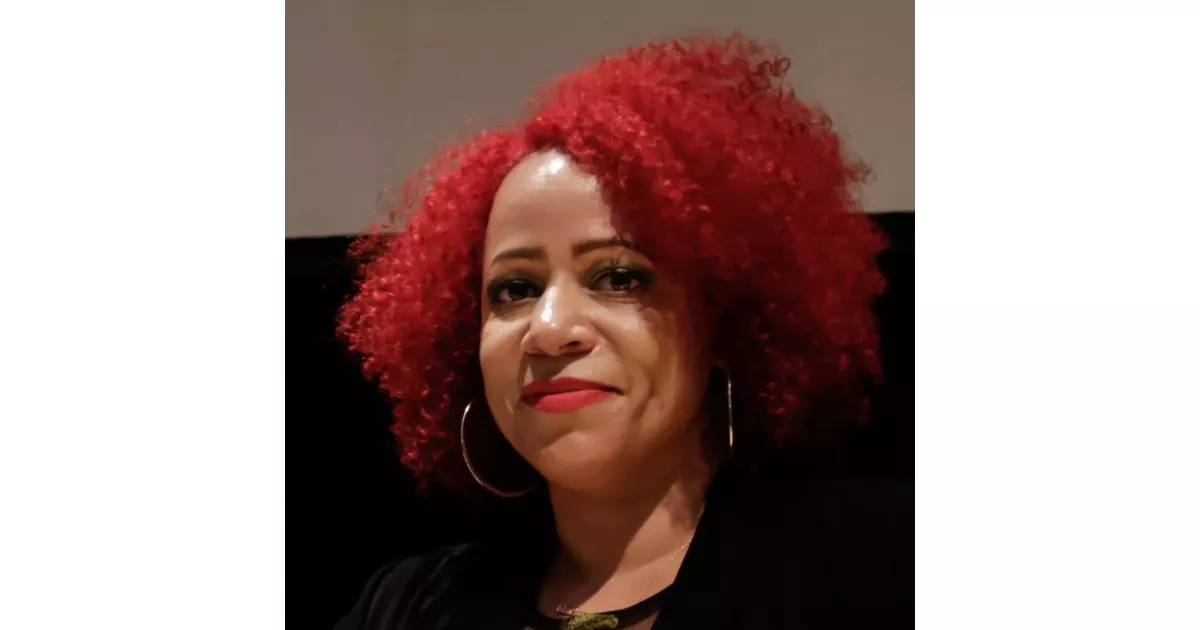"Nikole Sheri Hannah-Jones is a prominent American investigative journalist recognized for her impactful reporting on civil rights in the United States. Her notable contributions include joining The New York Times as a staff writer in 2015, receiving a prestigious MacArthur Fellowship in 2017, and being awarded the Pulitzer Prize for Commentary in 2020 for her significant work on The 1619 Project. Hannah-Jones holds the esteemed position of inaugural Knight Chair in Race and Journalism at the Howard University School of Communications, where she also established the Center for Journalism and Democracy."
April 9, 1976: Birth of Nikole Hannah-Jones
Nikole Sheri Hannah-Jones was born on April 9, 1976. She would become a prominent figure in investigative journalism, focusing on civil rights in the United States.
1994: Graduates High School
Nikole Hannah-Jones graduated from Waterloo West High School in 1994, where she actively participated in the school newspaper.
1995: Publishes "Modern Savagery"
In 1995, Nikole Hannah-Jones responded to a controversial article in the Notre Dame student newspaper with her own piece titled "Modern Savagery," sparking debate about race and history.
1998: Graduates from University of Notre Dame
In 1998, Nikole Hannah-Jones graduated from the University of Notre Dame with a Bachelor of Arts degree, majoring in history and African-American studies.
2003: Receives Master's Degree
Nikole Hannah-Jones earned a master's degree from the University of North Carolina Hussman School of Journalism and Media in 2003.
2003: Begins Career in Journalism
Nikole Hannah-Jones embarked on her journalism career in 2003, covering education, including the Durham Public Schools, for the Raleigh News & Observer.
2006: Joins The Oregonian
Nikole Hannah-Jones relocated to Portland, Oregon in 2006 to write for The Oregonian, where she covered a variety of beats, including features, demographics, government, and the census.
2007: Writes About the Watts Riots
In 2007, Nikole Hannah-Jones commemorated the 40th anniversary of the 1965 Watts riots by writing about the impact of the Kerner Commission on the affected community.
2008: Receives Fellowship to Study in Cuba
Nikole Hannah-Jones received a fellowship from the Institute for Advanced Journalism Studies in 2008, allowing her to travel to Cuba to study their healthcare and education systems.
2009: Continues Studies in Cuba
Nikole Hannah-Jones continued her research in Cuba throughout 2009, focusing on the country's universal healthcare system and educational approaches under Raúl Castro's leadership.
2011: Joins ProPublica
In 2011, Nikole Hannah-Jones began working at ProPublica, a nonprofit news organization based in New York City, where she focused on civil rights reporting, particularly issues related to redlining and the Fair Housing Act.
April 2015: Joins The New York Times
In April 2015, Nikole Hannah-Jones joined The New York Times as a staff writer, marking a significant step in her career.
2015: Becomes Staff Reporter for The New York Times
In 2015, Nikole Hannah-Jones officially became a staff reporter for The New York Times, further solidifying her role as a leading voice in investigative journalism.
2016: Launch of Ida B. Wells Society
Nikole Hannah-Jones, along with Ron Nixon, Corey Johnson, and Topher Sanders, founded the Ida B. Wells Society for Investigative Reporting in 2016 in Memphis, Tennessee. This organization was created to champion and advance investigative journalism.
2017: Awarded MacArthur Fellowship
Nikole Hannah-Jones received a MacArthur Fellowship in 2017, recognizing her contributions to journalism and her work on chronicling racial segregation.
2017: Receives MacArthur Foundation Fellowship
Nikole Hannah-Jones was recognized for her impactful work in 2017 with a MacArthur Foundation fellowship, highlighting her dedication to chronicling racial segregation and its impact on American society, particularly in education.
2017: Named Emerson Fellow
Nikole Hannah-Jones was selected as an Emerson Fellow at the New America Foundation in 2017, where she dedicated her time to working on her book project focused on school segregation in the United States.
August 14, 2019: Launches The 1619 Project
On August 14, 2019, Nikole Hannah-Jones launched The 1619 Project, a significant initiative aimed at reframing the understanding of American history by placing the consequences of slavery and contributions of Black Americans at its center.
2019: 1619 Project Named One of the Greatest Works of Journalism
New York University's Arthur L. Carter Journalism Institute recognized The 1619 Project as one of the ten greatest works of journalism between 2010 and 2019, acknowledging its impact and significance.
March 2020: Clarification Issued for The 1619 Project
In March 2020, a clarification was issued for The 1619 Project, addressing the debate surrounding the project's suggestion of 1619 as a potential turning point in U.S. history and its relation to the nation's founding.
June 2020: Apology for Retweet
In June 2020, Nikole Hannah-Jones issued an apology for retweeting a conspiracy theory that suggested "government agents" were behind the setting off of fireworks to undermine the Black Lives Matter movement.
June 2020: Book "The Problem We All Live With" Due for Release
Nikole Hannah-Jones' book, "The Problem We All Live With," exploring school segregation, was scheduled for release in June 2020 by Random House's One World imprint.
2020: Wins Pulitzer Prize for Commentary
Nikole Hannah-Jones was awarded the Pulitzer Prize for Commentary in 2020 for her impactful work on The 1619 Project.
April 2021: Announced as Knight Chair at UNC
The University of North Carolina announced in April 2021 that Nikole Hannah-Jones would join the Hussman School of Journalism and Media as the Knight Chair in Race and Investigative Journalism starting July 2021.
June 2021: Hannah-Jones Demands Tenure
In June 2021, Nikole Hannah-Jones, through her legal representatives, informed the University of North Carolina that she would only accept a faculty position if it included tenure.
June 30, 2021: Trustees Grant Tenure
After much controversy and debate, the Trustees for the University of North Carolina at Chapel Hill voted to offer Nikole Hannah-Jones a tenured position on June 30, 2021.
July 2021: Set to Join UNC
Nikole Hannah-Jones was scheduled to begin her role as the Knight Chair in Race and Investigative Journalism at the University of North Carolina's Hussman School of Journalism and Media in July 2021.
2021: Elected to American Academy of Arts and Sciences
Nikole Hannah-Jones achieved a significant honor in 2021 when she was elected as a member of the prestigious American Academy of Arts and Sciences.
January 2022: Launches 1619 Freedom School
In January 2022, inspired by the civil rights movement's Freedom Schools, Nikole Hannah-Jones and educator Sheritta Stokes established the 1619 Freedom School in Waterloo, Iowa, offering literacy enrichment programs for grade-school students.
May 2022: Criticism from Phillip W. Magness
Phillip W. Magness, a reporter for the libertarian magazine Reason, heavily criticized the 1619 Project in May 2022, referring to it as "junk history".
2022: Nominated for NAACP Image Award
Nikole Hannah-Jones received recognition for her work on The 1619 Project with a nomination for Outstanding Literary Work – Nonfiction at the 2022 NAACP Image Awards and was honored with the Social Justice Impact Award.
January 2023: William Simons' Critique
William Simons of the State University of New York at Oneonta critiqued Hannah-Jones' 1619 Project in January 2023, stating its solutions for racial inequity were more aspirational than analytical.
2024: Hannah-Jones Questions The Atlantic
Nikole Hannah-Jones disputed the accuracy of a 2024 essay published in The Atlantic. The essay, written by a former New York Times editor, claimed he had faced criticism from human resources for dining at Chick-fil-A due to the CEO's stance on same-sex marriage.
Mentioned in this timeline

Chick-fil-A is a prominent American fast food chain known for...

News encompasses information about current events disseminated through various media...

Fireworks are pyrotechnic devices primarily utilized for entertainment and aesthetic...
North Carolina is a Southeastern U S state the th-largest...

Books are a means of storing information as text or...
Iowa is a state in the U S Midwest bordered...
Trending

42 minutes ago Eddie Vedder's vulnerability shines in 'Matter of Time,' activism and EB research highlighted.
42 minutes ago Gold and Silver Market: Conflict and Uncertainty Impact Prices, ETF Investment Advised.
2 hours ago Smoothie King Employees Fired for Refusing Service to Customer Wearing Trump Hoodie.

2 hours ago Sydney Sweeney stuns fans with daring lingerie and tights poses for Syrn.

2 hours ago Justin Timberlake Sues to Block Release of DWI Arrest Video in Sag Harbor

2 hours ago Josh Duhamel Opens Up About His Divorce with Fergie, Expresses No Regrets.
Popular

Jesse Jackson is an American civil rights activist politician and...

Hillary Diane Rodham Clinton is a prominent American politician lawyer...

Jim Carrey is a Canadian-American actor and comedian celebrated for...

XXXTentacion born Jahseh Dwayne Ricardo Onfroy was a controversial yet...

Michael Joseph Jackson the King of Pop was a highly...

Bill Clinton served as the nd U S President from...
